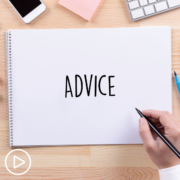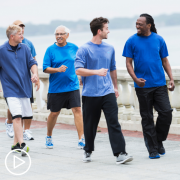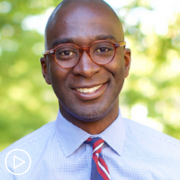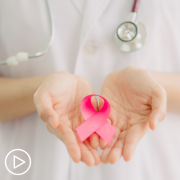Myeloma Support and Resources | Why It’s Essential to Voice Your Concerns
Myeloma Support and Resources | Why It’s Essential to Voice Your Concerns from Patient Empowerment Network on Vimeo.
Why should you speak up when it comes to your myeloma care? Dr. Sikander Ailawadhi discusses the importance of sharing issues with your healthcare team in order to access support and resources that can help.
Dr. Sikander Ailawadhi is a hematologist and oncologist specializing in myeloma at Mayo Clinic in Jacksonville, Florida. Learn more about Dr. Ailawadhi.
Related Resources:

Accessing Quality Myeloma Care | Advice for Overcoming Obstacles |

Key Advice for Myeloma Patients | Questions to Ask About a Care Plan |

|
Transcript:
Katherine:
I would like to talk more about self-advocacy, Dr. Ailawadhi, managing the worry associated with a diagnosis, concerns about relapse, side effects. It can lead to emotional symptoms like anxiety and fear for many. So, why is it important for patients to share any worries they’re having with their healthcare team?
Dr. Ailawadhi:
Yes. Extremely important. See, nobody’s thinking, “Okay, I’m going to have cancer today.” Nobody’s prepared for it ever. Cancer is always a diagnosis that comes out of the blue, blindsides us, and then suddenly we have to change the rest of our life because of it. Not only our life, our caregiver’s life, family’s life, everything changes.
So, it is okay to admit that it is difficult. It is okay to admit that we need help. And, Katherine, I like your kind of the use of the word, self-advocacy, although I want to qualify it.
A lot of times we say patients got to be their own advocates. But if a patient doesn’t know what to ask, they’re going to be lost. My thought is it is okay to – the first and foremost that a patient or their caregiver can do is please report your symptoms or how you’re feeling. And those symptoms could be physical, those could be psychological. Please report what are you feeling, what are the symptoms. On a drug, what are the side effects, et cetera, so that your healthcare team can try to address them. Don’t ever assume, “I am on chemotherapy. I should have diarrhea.” No. Don’t think, “I’m on chemotherapy. Other patients outside in the waiting room look sicker than I. I feel embarrassed to ask a question.”
We hear this so many times. A lot of patients will say, “I feel embarrassed to ask that I’m going through this symptom, because I see sicker people outside.” Yeah, but know when I’m with you as a patient, you are it. I’m not thinking about anybody else. And I don’t want anybody else’s decision to obscure or cloud our relationship at that visit. Please report your symptoms. Please ask for help.
To me, that is good enough self-advocacy. Self-advocacy is not saying, “I should get this treatment, not that treatment.” But self-advocacy could mean, are there clinical trial options? I know I live far away from a large center. Could I get a tele-visit with a large center? Could I get a second opinion from someone? Those are all very, very reasonable questions, and by asking those questions, a patient is advocating for themselves.
Katherine:
As you alluded, there’s a whole healthcare team working with each patient, and there’ll be people on that team who can help support a patient’s emotional needs. So, one thing that’s on the mind of many viewers is the financial aspect of care. And you mentioned that earlier everyone’s situation is different, of course, but where can patients turn if they need resources for financial support?
Dr. Ailawadhi:
Very important question. I can tell you every day when I come into my office, my nurse has a stack of documents ready for my signature. Every single day. Today, there was only one, but there could be different numbers. And these are generally from foundations from diagnosis confirmations, et cetera. Things that we are filling on and signing on behalf of our patients so that they are able to receive resources, whether it’s from a pharmaceutical manufacturer, a foundation, or society that has funding available, et cetera. I should start by saying, Katherine – and I feel embarrassed to admit this, but I should start by saying, I may not have all the answers for my patient during that visit.
But I think the very important piece where we can start is asking the patient, “Is this causing any financial strain on you?” As I mentioned earlier, we don’t think about, “Oh, I’m going to have cancer today. Let me prepare for that.” Or “I’m going to have cancer five years down the road. Let me prepare for that.” We’re not always ready for this. It’s okay. It’s important for me to ask if there is a problem, and it’s important for the patient to admit there’s a problem or say, “Well, I’m having difficulty with copayments.” And whatever may be difficult for one may be okay for the other. So, I shouldn’t assume. So, that discussion must happen.
Generally, in our setup, what happens is if the patient brings up a concern, if I identify a concern, or if we think something may be going on, but we’re not very sure about it, we tend to bring in our social workers. The social workers are typically the ones who are able to do that discussion with the patient, talk about what are the resources available. What are the foundations that we can apply to?
We have patient navigators who can do the similar things. So, the patient navigator, social worker, there are different individuals who will be able to provide much more granular information. I also strongly suggest patients to join support groups.
There are lots of resources, which I may not be aware of during our visit with a patient, but I can connect to the social worker, their patient navigators, and online support.















